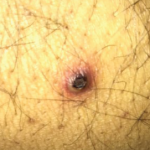NEW YORK (Reuters Health)—Helicobacter and Campylobacter species appear to play opposing roles in inflammatory bowel disease (IBD), according to a systematic review and meta-analysis.
The prevalence of IBD has increased steadily in the face of falling H. pylori infection rates, suggesting a negative association, whereas some studies have suggested that some Campylobacter species are involved in the pathogenesis of IBD.
Dr. Hazel M. Mitchell from The University of New South Wales in Sydney, Australia, and colleagues investigated the possible association between H. pylori, Helicobacter enterohepatic species (EHS), and Campylobacter and IBD in a review of 64 published studies (40 for H. pylori, 15 for Helicobacter EHS and nice for Campylobacter).
There was a consistent negative association between gastric H. pylori and IBD, with H. pylori appearing to reduce the odds of Crohn’s disease by 62%, of ulcerative colitis by 47%, and unclassified IBD by 57%.
These significant inverse associations persisted regardless of age, ethnicity and detection techniques, the researchers report in Gut, online Oct. 27.
Medications commonly used to treat IBD did not influence the negative association between H. pylori and IBD, but antibiotics appeared to amplify the negative association.
Helicobacter EHS, however, was associated with a borderline increase in IBD prevalence, and the association became significant when H. pylori was excluded from the analysis. There was a 2.62-fold increase in the odds of IBD in the presence of non-H. pylori EHS.
Campylobacter species were associated with a 2.97-fold increase in the odds of IBD, mainly due to C. concisus and C. showae.
“The results obtained by the current meta-analysis provide insights into the true direction of the association between H. pylori infection and IBD,” the researchers conclude. “If H. pylori infection indeed protects against IBD, selective treatment and surveillance of individuals at high risk of developing serious H. pylori-related gastric pathologies would be more relevant than a population-wide eradication approach, which has currently been proposed in some Asian countries.”
Dr. Mitchell did not respond to a request for comment.

